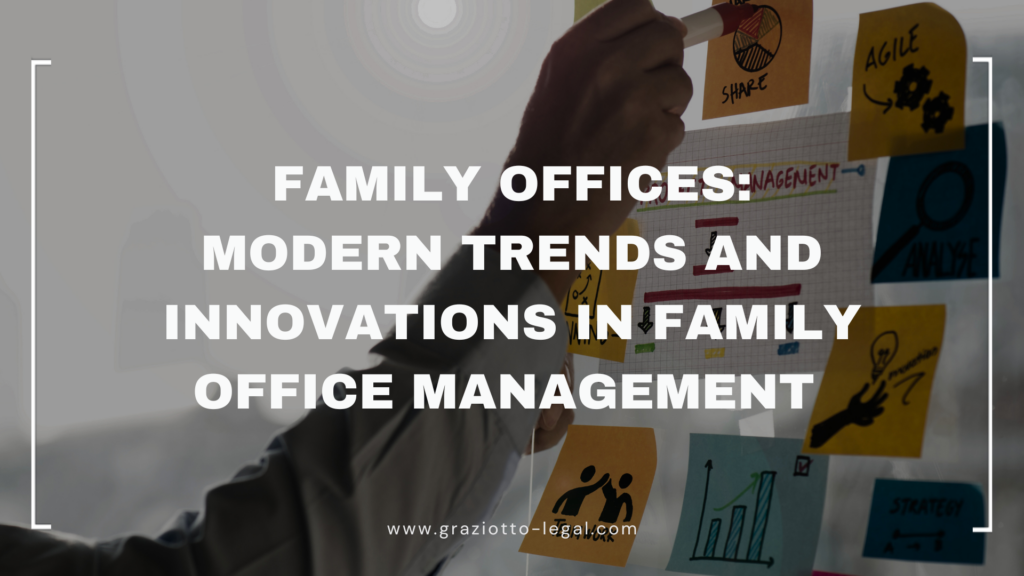

Since 2010, the Global Law Experts annual awards have been celebrating excellence, innovation and performance across the legal communities from around the world.
posted 2 weeks ago
The era of technology is inescapable, and its influence on the world of family offices is no exception. The implementation of technological advancements has not only transformed the way family offices operate but also redefined their core functions and strategies.
In the past decade, there has been a profound shift towards embracing technology to enhance efficiency, client engagement, data management, security, and even to shape the investment strategies of family offices. Let’s explore these dimensions in detail.
The automation of routine tasks and complex processes has brought about unprecedented efficiency within family offices. Tools and software have replaced manual labor, streamlining tasks such as reporting, analytics, portfolio management, and risk assessment. This has led to a significant reduction in human error and increased time saving, allowing family offices to concentrate more on strategic activities.
Big Data has emerged as a game-changer in the investment world. Family offices are leveraging data analytics to gain insights into market trends, investment opportunities, and client behavior. Machine learning and artificial intelligence algorithms can analyze vast amounts of data to predict market movements or to tailor investment strategies to individual family needs.
With the advent of technology, cybersecurity has become a primary concern. Family offices often manage substantial assets, and the confidentiality of information is paramount. To ensure security, there’s a growing trend to employ cutting-edge cybersecurity measures, such as end-to-end encryption, biometric authentication, and the use of private clouds.
Technology has also transformed client engagement. Family offices are utilizing digital platforms to enhance client communication and provide personalized experiences. The introduction of client portals, interactive dashboards, and real-time notifications has facilitated more transparent and immediate communication. Clients now have direct access to their portfolios, reports, and even financial planning tools, offering them greater control and engagement.
Family offices are increasingly investing in fintech startups and incorporating fintech solutions into their structures. By embracing blockchain technology, robo-advisors, and various other fintech innovations, family offices are staying at the forefront of technological transformation. This investment in fintech not only enhances internal operations but also diversifies the investment portfolio.
The emergence of cloud computing and collaborative tools has enabled virtual and remote operations, particularly significant in the wake of global pandemics like COVID-19. Family offices can now operate with a global reach, engaging with clients and professionals across the world without geographical limitations.
Technological advancements have also facilitated the integration of Environmental, Social, and Governance (ESG) factors into investment strategies. Family offices are using technology to assess and monitor ESG metrics, aligning investments with the ethical values of the family.
The term Digital Transformation denotes a comprehensive shift in business processes, organizational culture, and technology integration. In the context of family offices, this transformation is not merely about implementing new technology tools but revolutionizing the whole approach to client service, operational efficiency, and strategic planning.
1. Strategic Planning and Digital Roadmap: Family offices are adopting a digital roadmap to align technology with business goals. This process begins with defining the vision, assessing the existing technological landscape, and then outlining a step-by-step implementation strategy.
2. Integration of Cloud Services: The integration of cloud services allows for more scalable and flexible operations. Family offices can access real-time data from any location, facilitating seamless collaboration and decision-making.
3. Adoption of AI and Machine Learning: AI-powered tools are becoming increasingly sophisticated, allowing family offices to analyze large data sets for insights, automate complex processes, and even interact with clients through AI-driven chatbots.
4. Client Experience Transformation: By leveraging customer relationship management (CRM) platforms, mobile apps, and personalized portals, family offices are providing a more interactive and tailored client experience.
5. Regulatory Compliance and Technology: Complying with regulatory requirements is a complex challenge, but technology offers solutions for automating compliance tasks, monitoring regulations, and ensuring adherence to legal standards.
6. Technology Talent Acquisition: As family offices embrace digital transformation, there is an increasing need for tech-savvy professionals who can navigate the complex landscape of modern technology. Hiring and retaining the right talent is essential to a successful digital strategy.
7. Investment in Emerging Technologies: Virtual reality, augmented reality, and Internet of Things (IoT) are among the emerging technologies that are beginning to find applications in family offices. These technologies offer innovative ways to engage with clients, visualize data, and even create new investment opportunities.
Family offices are also exploring collaborations and partnerships with tech companies, startups, and other financial institutions to leverage technology effectively. This collaborative approach often involves:
1. Strategic Alliances with Tech Firms: Partnering with established technology companies enables family offices to access advanced tools and platforms without the need to build them in-house.
2. Investment in Tech Startups: Investing in promising tech startups not only provides financial returns but also allows family offices to integrate innovative solutions into their operations.
3. Collaboration with Other Financial Institutions: By working with banks, asset managers, and other family offices, technological solutions can be shared and optimized, leading to cost savings and enhanced functionality.
4. Technology Consultancies and Outsourcing: Engaging with specialized technology consultancies and outsourcing certain tech functions can provide expertise and flexibility, enabling family offices to remain agile and responsive to technological changes.
The technological advancements in the family office space have been profound and multifaceted. From automating routine tasks to employing cutting-edge data analytics, cybersecurity measures, client engagement tools, fintech solutions, and ESG integration, technology is reshaping the way family offices function. It has introduced new opportunities and challenges, adding new dimensions to the role of family offices in wealth management.
The trends and innovations in technology are evolving rapidly, and family offices must stay abreast of these changes to continue to thrive in this dynamic environment.
The technological era in family office management is not just about tools and software; it’s about a paradigm shift in thinking and approach that recognizes the immense potential that technology offers in enhancing efficiency, customization, global reach, and aligning investments with values.
Technological advancements are altering the landscape of family office management in profound ways. The journey towards technological integration is multifaceted, encompassing everything from automation and cybersecurity to digital transformation, collaboration, and investment in emerging technologies.
It’s not merely a matter of implementing tools; it’s about a comprehensive approach that aligns technology with strategic goals, client needs, regulatory compliance, and the broader global trends.
Family offices must recognize that technology is an evolving field, and staying updated requires continuous learning, adaptation, and sometimes even a willingness to disrupt traditional models.
Those who embrace technology not as an add-on but as an integral part of their strategy will find themselves better positioned to serve their clients, manage assets, and navigate the complex and ever-changing world of modern finance.
For more in-depth information you can consult my latest book «The Global Manual for Family Offices», Volume 1, Chapter 4.2.1, Pg. 255.
Author


No results available
Resetposted 2 days ago
posted 3 days ago
posted 3 days ago
posted 6 days ago
posted 1 week ago
posted 1 week ago
posted 1 week ago
No results available
ResetSign up for the latest advisory briefings and news within Global Advisory Experts’ community, as well as a whole host of features, editorial and conference updates direct to your email inbox.
Naturally you can unsubscribe at any time.
Global Advisory Experts is dedicated to providing exceptional advisory services to clients around the world. With a vast network of highly skilled and experienced advisers, we are committed to delivering innovative and tailored solutions to meet the diverse needs of our clients in various jurisdictions.